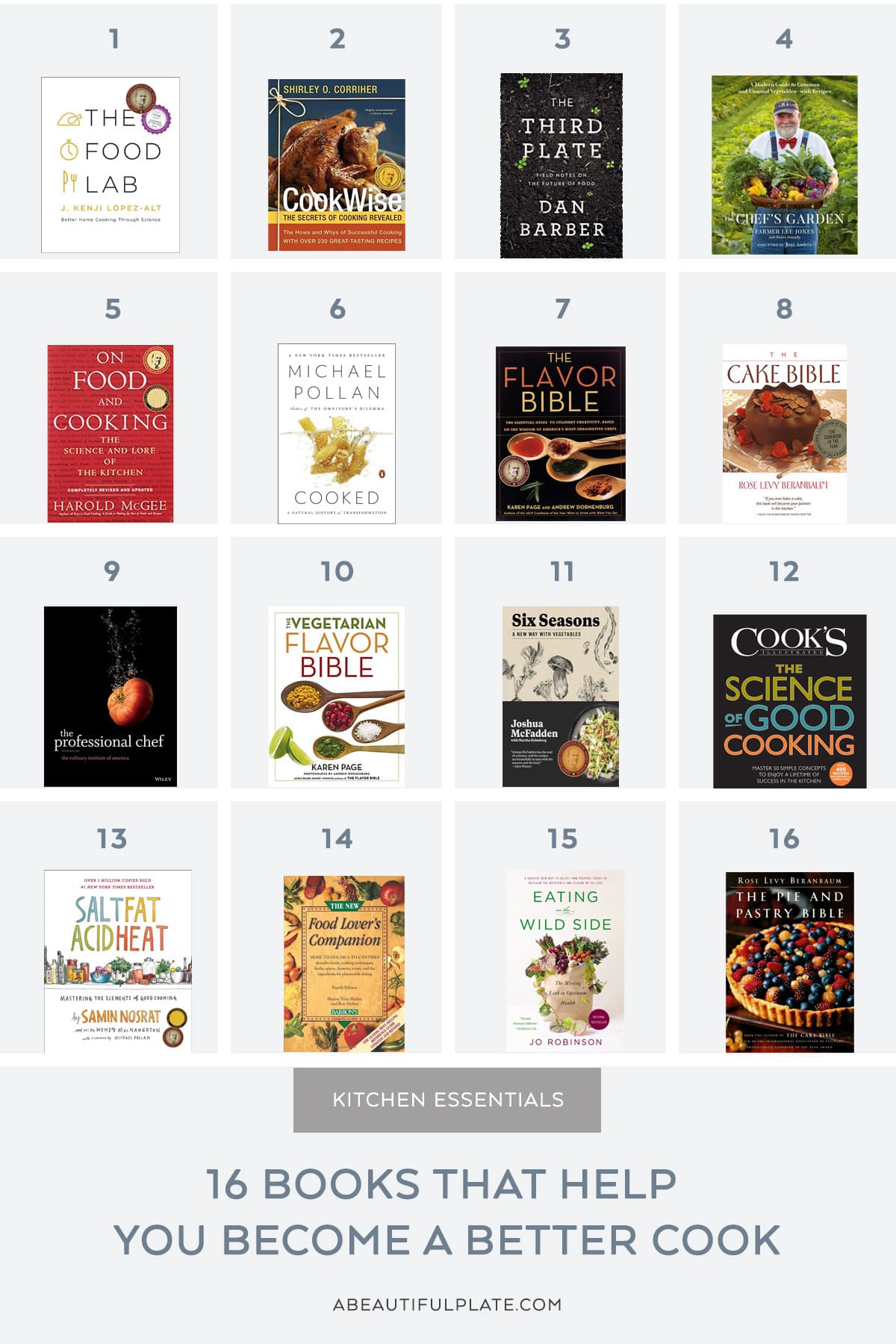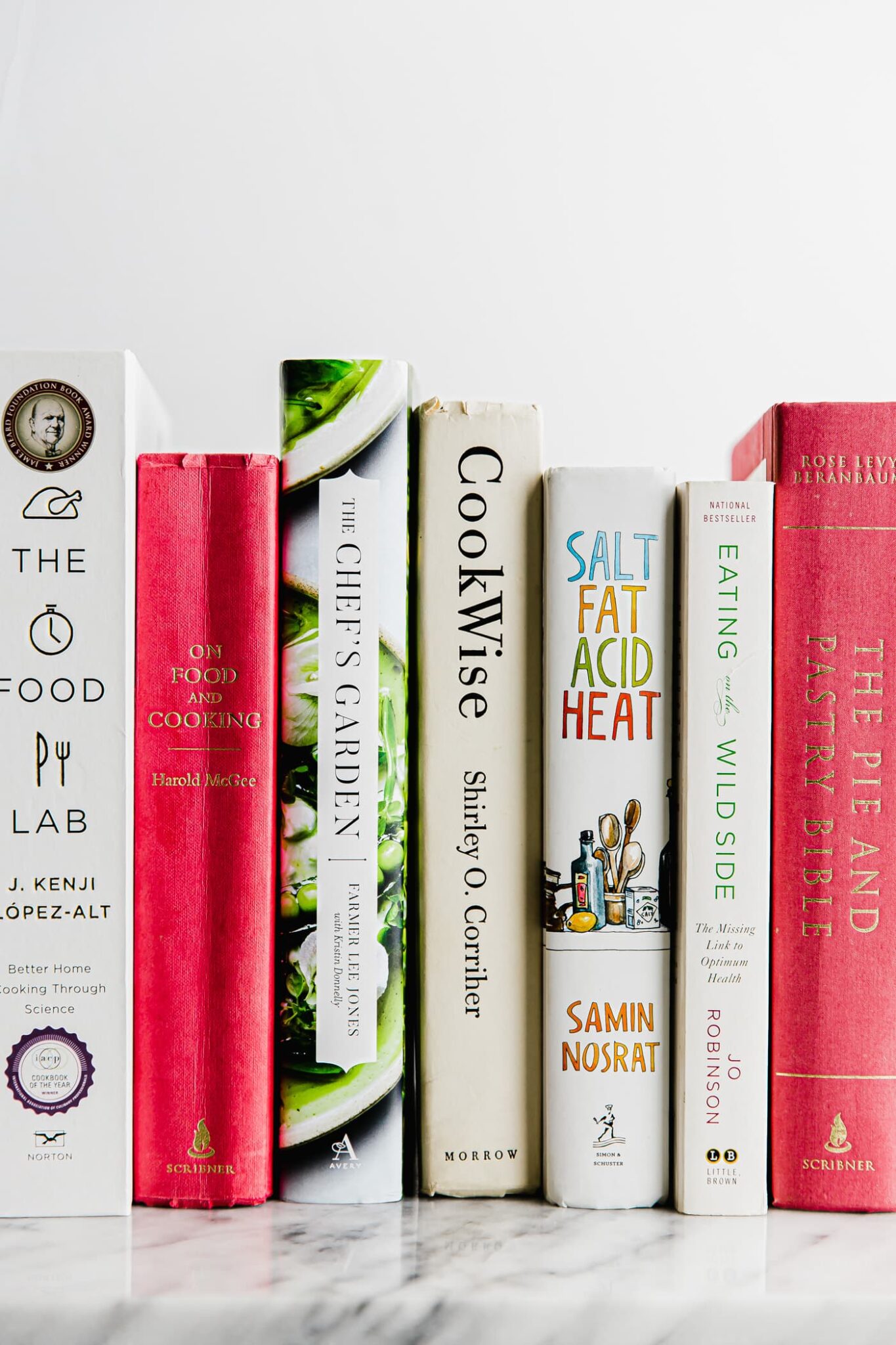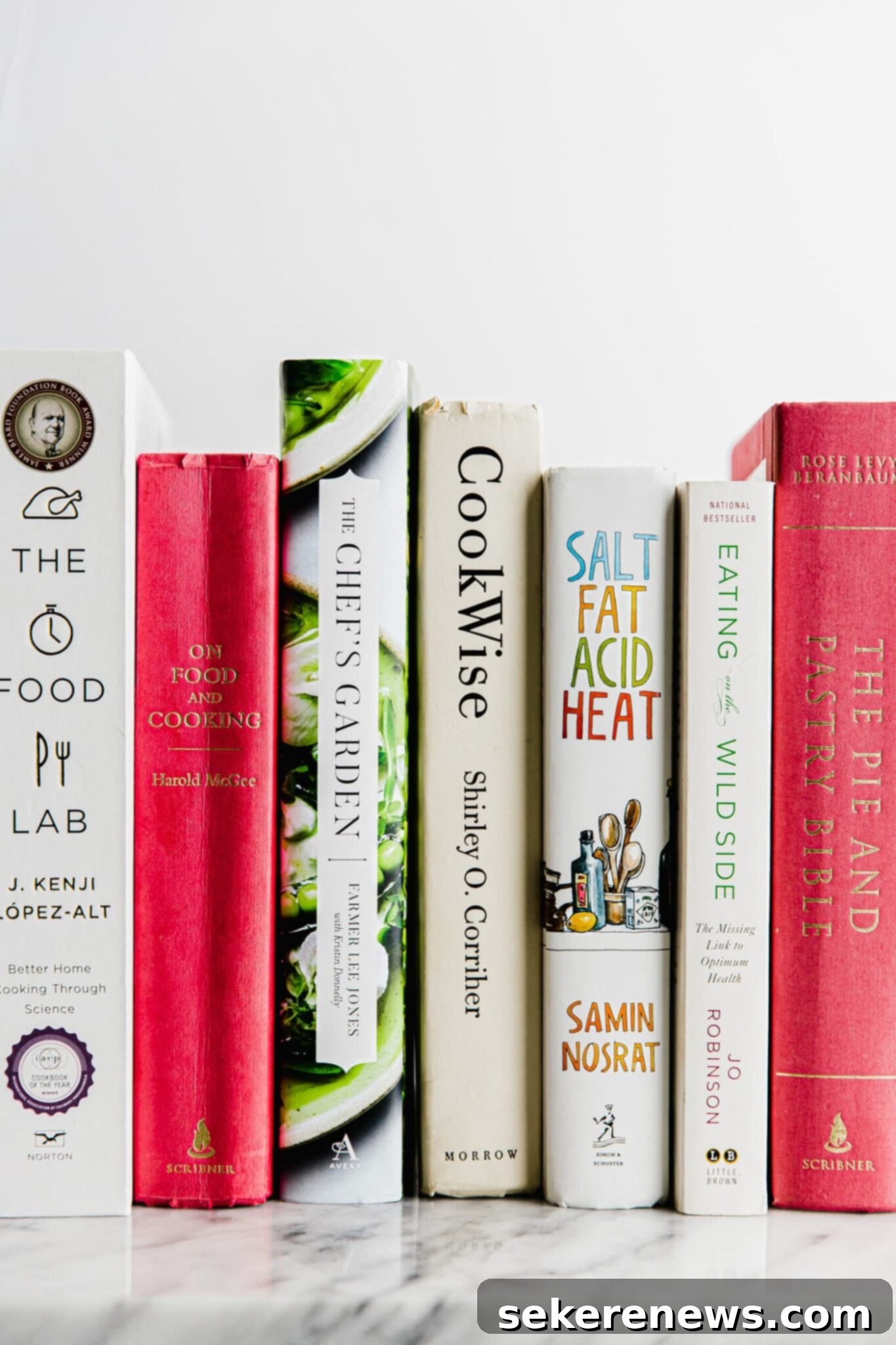Elevate Your Culinary Skills: The Ultimate Guide to the Best Cooking Books and Reference Guides

Welcome to an updated and comprehensive guide to my most cherished cooking reference books and cookbooks! These are the essential titles that have found a permanent home on my shelves, serving as invaluable resources that I return to time and time again. Each book on this list has played a pivotal role in shaping my culinary approach, helping me to evolve into a more creative, mindful, and intuitive cook.
My journey through the world of food deepened significantly during my time in culinary school, where many of these foundational texts first captured my attention. Over the years, new additions have graced my library, whether through thoughtful gifts or recent publications, and each has instantly become a beloved companion in my kitchen. This collection isn’t just about recipes; it’s about understanding the core principles of cooking, the intricate relationships between ingredients, and the broader context of our food system.
If your goal is to become a more intuitive cook, to truly grasp the why’s behind every culinary technique, or simply to deepen your knowledge of the food world, then I wholeheartedly recommend exploring these titles. Adding them to your personal collection will not only enrich your cooking experience but also transform your perspective on food preparation. This curated list features a blend of dense reference manuals, traditional cookbooks, specialized guides focusing on specific categories like baking, and even thought-provoking non-fiction works. Rest assured, every single book here offers immense value, promising countless hours of learning and inspiration. Happy cooking!
Top Cooking Books to Master Your Kitchen:
Here’s a detailed look at the books that have profoundly impacted my cooking, ranging from scientific explorations to practical guides and philosophical discussions on food.
- The Food Lab: Better Home Cooking Through Science by J. Kenji López-Alt – For those who revel in understanding the scientific principles behind culinary success, J. Kenji López-Alt’s *The Food Lab* is an indispensable masterpiece. Widely acclaimed, especially among fans of *Serious Eats*, this monumental, textbook-sized tome demystifies the art of cooking by meticulously exploring the ‘why’s’ behind every technique. Kenji’s rigorous, scientific methodology transforms the kitchen into a laboratory, demonstrating the most effective and efficient ways to prepare an astonishing array of dishes. From perfectly searing a steak to crafting the creamiest mashed potatoes, this book breaks down complex processes into understandable, actionable steps, equipping home cooks with the knowledge to consistently achieve exceptional results. It’s more than a cookbook; it’s a comprehensive educational tool that empowers you to become a more intuitive and confident chef by truly understanding your ingredients and methods.
- CookWise: The How’s and Why’s of Successful Cooking by Shirley O. Corriher – Shirley O. Corriher’s *CookWise* masterfully blends the practicality of a cookbook with the depth of a scientific reference guide. I’ve frequently turned to this volume to fine-tune recipes or to gain a deeper understanding of specific cooking techniques and the precise roles various ingredients play. Shirley brilliantly challenges conventional cooking wisdom, diving deep into everything from the intricacies of bread making and the science of perfect cookies and cakes, to fundamental categories like crafting superior stocks and roasting a flawless chicken. Her approach ensures that you’re not just following instructions but truly comprehending the mechanisms at work, empowering you to adapt and create with confidence.
- The Third Plate: Field Notes on the Future of Food by Dan Barber – Without a doubt, *The Third Plate* stands out as one of the most insightful and transformative books I’ve ever encountered on the food system. Dan Barber, a renowned chef and restaurateur, takes readers on a profound journey, tracing the evolution of our food system to its current state. His narrative compellingly argues for a shift towards a more sustainable and integrated approach to agriculture and dining, advocating for ingredients that complement each other ecologically as well as culinarily. This exceptionally well-written book challenges preconceived notions about what we eat and how it’s produced, prompting a fundamental rethinking of our relationship with ingredients and the land. It’s a must-read for anyone interested in the future of food.
- The Chef’s Garden: A Modern Guide to Common and Unusual Vegetables by Farmer Lee Jones – A stunning recent addition to my culinary library, Farmer Lee Jones’s *The Chef’s Garden* is a truly beautiful and exhaustive guide to over 600 varieties of vegetables, both familiar and exotic. Each meticulously detailed section provides essential information on how to select, store, clean, and optimally utilize every ingredient, making it an invaluable resource for both home cooks and professional chefs. Beyond the comprehensive practical advice, the book features 125 innovative and often complex recipes, masterfully crafted by Jamie Simpson, the executive chef at The Chef’s Garden Culinary Vegetable Institute. This book not only expands your vegetable repertoire but inspires a deeper appreciation for the produce itself.
- On Food and Cooking: The Science and Lore of the Kitchen by Harold McGee – If I were limited to owning just one cooking reference book, Harold McGee’s *On Food and Cooking* would be my undisputed choice. It’s difficult to overstate my admiration for this seminal work. Have you ever pondered the precise role of sugar in baked goods, or why slicing onions brings tears to your eyes? I can confidently guarantee that the answers to virtually any culinary question you might have are contained within these pages. Despite its encyclopedic scope, the book is surprisingly approachable and engaging, transforming complex scientific concepts into digestible and fascinating insights. It’s an essential text for anyone eager to understand the fundamental chemistry and history behind the food they prepare.
- Cooked: A Natural History of Transformation by Michael Pollan – While perhaps not as lighthearted or immediately engaging as *The Third Plate*, Michael Pollan’s *Cooked* offers a similarly profound, albeit different, kind of fascination. This compelling narrative provides a historical and in-depth exploration of the four classical elements of cooking – fire, water, air, and earth. Pollan delves into how these elemental forces have shaped not only our food but also human society, culture, and our very evolution. It’s a thoughtful and enlightening read that connects the fundamental acts of cooking to broader societal patterns, urging us to reconsider the simple yet profound magic that happens when food is transformed.
- The Flavor Bible: The Essential Guide to Culinary Creativity, Based on the Wisdom of America’s Most Experienced Chefs by Karen Page and Andrew Domenburg – *The Flavor Bible* is an extraordinary resource that focuses exclusively on the art of ingredient pairing, presented primarily in an easy-to-navigate list format (with the exception of its insightful introduction). Whenever I find myself creatively stalled for new recipe ideas or striving to introduce a unique, harmonious element to a dish, this book is my immediate go-to for inspiration. It acts as an incredible creative springboard, helping me to develop twists on beloved classics or to embark on entirely new culinary creations from scratch. For any aspiring chef or home cook looking to elevate their dishes and understand flavor dynamics, this is an absolutely indispensable guide.
- The Cake Bible by Rose Levy Beranbaum – Rose Levy Beranbaum’s *The Cake Bible* transcends the typical cookbook format, functioning as an exhaustive masterclass in baking. Its pages are brimming with an astounding level of detail, thanks to Beranbaum’s incredibly thorough recipes, expansive chapter introductions, and precise instructions. Notably, she provides ingredient measurements down to the half gram, alongside traditional volume and ounce measurements, ensuring unparalleled accuracy. What truly sets this book apart is Beranbaum’s commitment to explaining the ‘why’s’ behind every technique and ingredient choice for each recipe. If you’ve ever questioned the necessity of specific steps in cake baking, you’ll gain a complete understanding by the time you’ve absorbed her meticulously detailed guidance. It’s the ultimate guide for mastering the art and science of cake.

- The Professional Chef by The Culinary Institute of America – This esteemed volume is the very same textbook provided to students enrolled at the prestigious Culinary Institute of America, making it an authoritative guide for serious cooks. While not a book I reference daily, I firmly believe that owning a high-quality, comprehensive reference textbook like this is absolutely essential for anyone deeply passionate about cooking. It covers a vast array of fundamental culinary techniques, classical preparations, and essential kitchen knowledge. Crucially, it includes invaluable step-by-step photography, which is an unparalleled asset for visual learners mastering new skills, such as how to fillet fish, advanced knife skills, or various cuts. It’s a foundational text for any serious culinary library.
- The Vegetarian Flavor Bible by Karen Page and Andrew Domenburg – Building on the success of their original *Flavor Bible*, Karen Page and Andrew Domenburg deliver an equally indispensable resource for plant-based cooking with *The Vegetarian Flavor Bible*. This specialized version offers an extensive A-Z compilation of flavor pairings specifically tailored for vegetables, fruits, grains, nuts, legumes, seeds, and many other plant-based ingredients. It empowers vegetarian and vegan cooks, as well as those looking to incorporate more plant-forward dishes, to create imaginative and incredibly delicious meals. Much like its predecessor, it’s an invaluable tool for sparking culinary creativity and ensuring every dish achieves perfect flavor harmony without relying on meat.
- Six Seasons: A New Way to Cook Vegetables by Joshua McFadden and Martha Holmberg – *Six Seasons* presents an inspiring and incredibly approachable collection of seasonal recipes, masterfully designed to highlight the natural flavors of vegetables without requiring extensive ingredients or fuss. While not strictly a traditional reference cookbook, its pages are packed with invaluable guidance and practical tips on how to coax the absolute maximum flavor out of seasonal produce. Joshua McFadden’s unique approach to the “six seasons” (breaking down traditional seasons further) encourages cooks to truly engage with their ingredients throughout the year. You will undoubtedly fall in love with this book for its fresh perspective and delicious, vegetable-centric dishes.
- The Science of Good Cooking by America’s Test Kitchen – From the trusted experts at America’s Test Kitchen, *The Science of Good Cooking* is a brilliant reference book that intertwines scientific explanation with practical application. It systematically explores 50 fundamental cooking concepts, each accompanied by illustrative recipes that demonstrate the principle in action. If you’re a fan of *Cook’s Illustrated* magazine or America’s Test Kitchen articles, you’ll find the format and detailed, experimental approach of this book highly familiar and engaging. It’s designed to help you understand not just how to cook, but *why* certain methods work best, enabling you to master essential techniques and consistently produce excellent results in your kitchen.
- Salt, Fat, Acid, Heat: Mastering the Elements of Good Cooking by Samin Nosrat – Samin Nosrat’s *Salt, Fat, Acid, Heat* is an extraordinary achievement in culinary education, distilling the intimidating fundamentals of cooking into an incredibly approachable and easy-to-understand framework. Nosrat masterfully teaches how to balance these four essential elements – salt, fat, acid, and heat – to create truly delicious food, regardless of the recipe. Illustrated beautifully and reading more like a captivating novel than a textbook, this book is an invaluable resource for cooks of all skill levels. It empowers you to instinctively taste, adjust, and understand food, making it one of the most accessible and impactful reference books on this entire list.
- Food Lover’s Companion by Ron and Sharen Herbst – For anyone seeking a compact, user-friendly glossary encompassing nearly every food ingredient, cooking technique, or international dish imaginable, Ron and Sharen Herbst’s *Food Lover’s Companion* is an absolute gem. This concise yet comprehensive book becomes an indispensable tool when you’re venturing into more technique-driven or international cookbooks, exploring specialty supermarkets brimming with unfamiliar ingredients, or simply puzzled by a new dish on a restaurant menu. Its clear definitions and brief explanations provide quick clarity, saving you time and enhancing your culinary adventures by making the unfamiliar accessible and understandable.
- Eating on the Wild Side: The Missing Link to Optimizing Your Health with Plant-Based Foods by Jo Robinson – Jo Robinson’s *Eating on the Wild Side* is a fascinating and highly practical book that addresses a crucial aspect of modern nutrition: reclaiming the vital nutrients in food that have been diminished by contemporary agricultural practices. This insightful read offers actionable advice, such as identifying which tomatoes at a standard grocery store boast the highest phytonutrient content, or the optimal methods for selecting and storing lettuce to maximize its health benefits. I particularly appreciate this book because it steers clear of preachy, unrealistic dietary mandates, instead providing practical, evidence-based tips and information that anyone can readily apply to how they choose and prepare their ingredients. It reads like an engaging novel but serves as a perennial reference.
- The Pie and Pastry Bible by Rose Levy Beranbaum – If your culinary passions lie in the delicate art of baking pies and pastries, then Rose Levy Beranbaum’s *The Pie and Pastry Bible* is an absolute must-have staple for your kitchen shelf. Structured with the same meticulous attention to detail and exhaustive precision as her acclaimed *The Cake Bible*, this cookbook dedicates itself entirely to the world of pies and pastries. It comprehensively covers everything from exquisite tarts and savory quiches to the intricacies of laminated doughs, homemade ice creams, a vast array of fillings and toppings, and perfect glazes. This book is your ultimate guide to mastering every facet of successful pie and pastry baking.
This carefully curated selection of cooking books represents more than just a collection of recipes; it’s a foundation for building true culinary understanding and confidence. Whether you’re a novice home cook eager to learn the basics, or an experienced chef looking to deepen your scientific knowledge or expand your creative horizons, these titles offer unparalleled value. Each book provides a unique lens through which to view the world of food, ensuring that every dish you prepare is infused with greater knowledge, intention, and flavor.
By investing time in exploring these guides, you’re not just learning to follow instructions, but cultivating the skills and intuition to become a truly exceptional and adaptable cook. Dive in, experiment, and let these incredible authors guide you on your journey to culinary excellence!
If you enjoyed this post and are keen to further your culinary journey, be sure to explore our other cooking guides for more tips and techniques.
